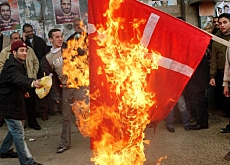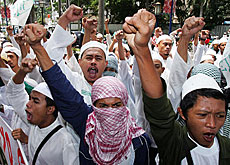Cartoonist urges calm over Mohammed images

Swiss cartoonist Chappatte gives swissinfo his take on the controversy surrounding the publication of Mohammed cartoons in a Danish newspaper.
Chappatte says freedom of expression is something “visceral” but admits that it is now time for dialogue between the two sides rather than a debate on principles.
The outcry among Muslims over the cartoons, which were republished in several European and Swiss newspapers last week, shows no sign of abating.
On Monday at least four people died in rallies in Afghanistan and Somalia. There were also attacks against Danish embassies in Syria and Lebanon over the weekend.
On Saturday the Pakistani government summoned diplomatic representatives from Denmark and several other European countries, including Switzerland, to express its displeasure at the cartoons.
swissinfo: What is your view on the rising and spreading tensions surrounding the publication of the cartoons?
Chappatte: I am appalled and saddened, because we’re soon going to find ourselves in a situation where, if this continues, [more] people are going to die. Unfortunately we are no longer at the point where we can afford to have a debate on the freedom of speech.
It is desperately important that we calm down, postpone the debate – something it pains me to say – and try to enter into a dialogue.
swissinfo: What is your reaction to the fact that several European newspapers, including Swiss ones, have republished some of these cartoons?
C.: I have a mixed reaction. On the one hand, it’s necessary to see what is being discussed and to know what you are talking about. Therefore it’s important to look at the cartoons and to form an opinion.
But the reality is that each publication [of the cartoons] stirs up something which is getting out of control. It’s an explosive situation and it’s not about trying to outdo your rivals.
swissinfo: So you think we have gone beyond a debate on the freedom of expression?
C.: We’ll have this debate one day. But one can’t remain on the level of absolute principles. There is an enormous lack of understanding. For me as a newspaper cartoonist freedom of speech is something visceral. And in Islam, the representation of Mohammed is absolutely forbidden, therefore that also touches the visceral.
swissinfo: Does the freedom of expression allow us to pass over this ban? Would you do it?
C.: That’s not the real issue. I’m not Muslim and therefore nobody can stop me from depicting Mohammed in a newspaper cartoon, a cartoon I draw because I want to express something that I feel strongly about. That’s my position.
On the other hand, the motives behind the commissioning of the Danish cartoons are dubious. Mohammed was not brought in as a character in a newspaper cartoon. The actual goal of the exercise was to depict Mohammed precisely because it is forbidden to do so.
It’s as if they were saying to Muslims: “Look, it’s your taboo! But me, I’m free to do what I want.” One shouldn’t be naïve, it was a provocation.
Personally, I’m not interested in provoking for the sake of provocation. Drawing is a weapon, but a weapon one should use with care. In this case I find it a bit cheap to test one’s freedom on the back of someone else’s faith.
swissinfo: Some people have made political capital out of the affair…
C.: Of course. The Muslim issue of not depicting Mohammed was not controversial until now – there have already been some illustrations of Mohammed in newspaper cartoons which didn’t cause such reactions.
But this time, some states have been quick to twist the situation in a reprehensible way and I am disappointed that even some of the Muslim elite are pretending not to know the difference between a Danish cartoonist and the whole country, or even the European Union. They are making a very dishonest comparison.
swissinfo-interview: Bernard Léchot
Patrick Chappatte publishes his cartoons in the French-speaking Le Temps newspaper and the German-speaking Neue Zürcher Zeitung as well as the International Herald Tribune.
He has published several cartoon books on world affairs, as well as a travel diary.
On September 30, 2005 12 satirical cartoons each featuring Mohammed appeared in the Danish daily newspaper Jyllands-Posten.
The images provoked a wave of protests in the Muslim world, with many condemning the cartoons as an outrage as Islamic tradition bans depictions of the prophet or Allah.
The cartoons were reprinted by several European newspapers, including a number of Swiss publications.

In compliance with the JTI standards
More: SWI swissinfo.ch certified by the Journalism Trust Initiative










You can find an overview of ongoing debates with our journalists here . Please join us!
If you want to start a conversation about a topic raised in this article or want to report factual errors, email us at english@swissinfo.ch.